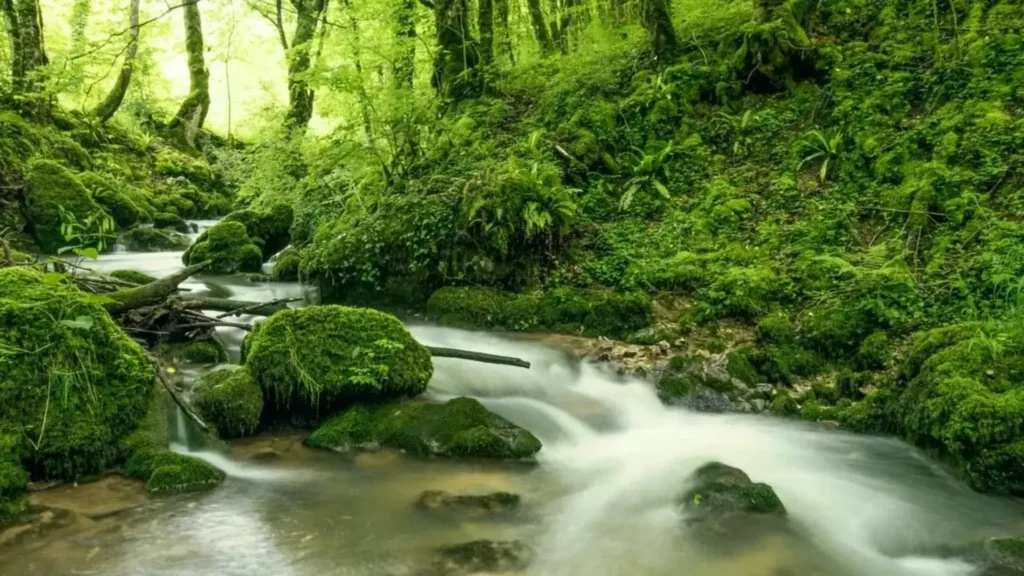Introduction: Natural environment refers to all the things existing in the world unaltered by human beings or human actions, examples are: forests, rivers, mountains, wildlife, among others. It is very significant for the sustenance of life on this planet and supports ecosystems that provide several valuable resources. This balance of the natural resources, such as the land resources, water, and air as sources of life is present. It is, however, very surprising and importance of these things that all forms of life in existence would be unable to survive if the natural environment were not healthy. Conservation is not limited to the aesthetic value of the face of the earth, but also for future generations to be born and enjoy the fruits of the earth.
How Nature Supports Human Life?
Clean Air and Its Role in Health:
There are numerous reasons that point to the fact that air quality can influence the well-being of people. Trees and plants help in absorbing carbon dioxide and give out oxygen. And hence help in causing fresh and breathable air. Airborne pollutants from industries and vehicles are known to cause respiratory illnesses or diseases, but these pollutants can be checked by natural barriers.
Thus, green spaces in cities decrease pollution levels and have a positive impact on people’s health. These fans will also improve the circulation of fresh air in and outside the house, enhancing immunity to diseases of the lungs. Maintaining a clean environment complies with the interests of both man and animals who exist on planet Earth.
The Importance of Fresh Water Sources for natural environment:
It is an acknowledged fact that water is an essential requirement in the lives of people. All these water sources, rivers, lakes, and groundwater, are used for drinking water as well as for irrigation. Sadly, pollutants and overabundance endanger the availability of water.
Conservation of water resources is essential in order to be assured of enhanced accessibility to clean water. Natural water sources also improve the aquatic life, thereby enhancing its productivity in terms of the variety of living things that exist in it.
Soil and Agriculture: The Foundation of Food Production
To have a successful crop, there is nothing as important as having good soil. It must contain those elements which are essential for the growth of plants, thus making possible the practice of agriculture. Depending on the quality of the soil, the production of crops will be reduced, thus shortening the supply of food. Soil strength is eroded, deforestation and pollution, thus any long-term farming is possible only through sustainability practices.
Mental and Physical Benefits of Nature

Nature’s Impact on Mental Well-being:
Heinz was able to increase its revenues because it provided its customers with an opportunity of a trip to visit a facility with a natural environment. Knowing that time in the outdoors has importance such as reducing stress, thus enhancing the mental health of a person.
Research indicates that such people have reduced stress levels or anxiety and cases of depression in individuals. Green areas offer individuals the opportunity to escape from the daily stress factors and relax. There, it is briefly discussed how, for example, the practice of forest bathing has become an excellent method of relaxation and rejuvenation.
Outdoor Activities and Physical Health:
Exercising outdoor, such as walking, running, and cycling, is one of the good ways of enhancing our physical body system. Lack of some natural environment promotes movement to enhance cardiovascular circulation, not causing damage to the muscles. That is why there are moments people are advised to be exposed to the sun to improve their vitamin D intake, which enhances bone health.
Biodiversity and Ecosystem Balance
The Role of Wildlife in Nature:
They discussed the importance of wildlife conservation about the evolution of the different ecosystems for natural environment. Every living organism, whether a grasshopper or an elephant, plays its role in the maintenance of the diversification of species. They limit the number of one particular species, hence ensuring that the number of animals in a specific species does not increase beyond the recommended limit.
The butterflies and bees are important for the pollination of flowers, and so are birds that feed on fruits. Conservation of wildlife came into practice in order to maintain the balance by stabilizing food chains and ecosystems. And so it is seen with most species, whose existence is under threat from habitat destruction and poaching.
Why Ecosystem Conservation Matters?
Ecosystems play roles such as purification of the air, filtering of water sources, and regulation of climate. People have claimed that they support various forms of life and play a role in the natural transactional process. Some of the ways through which human beings contribute to the disruption of ecosystems. Whereby the environment is destroyed, include deforestation and water pollution.
National parks and wildlife reserves are some of the measures that are used in the conservation of these systems. The concept of sustainable ecosystems, as used here. Means the ability of ecosystems to sustain life and resilience to environmental changes if there is conservation of the species in question.
Climate Regulation and Environmental Protection

Forests as Carbon Sinks:
Cutting through all the greenery and planting trees are known to absorb carbon dioxide in the atmosphere and release oxygen, thus participating in reducing greenhouse gases in the atmosphere. They also constitute carbon sinks, hence playing a role in controlling climate change impacts.
This disturbs this balance and results in the emission of carbon into the atmosphere. Reforestation and afforestation techniques assist in the recovery of forest resources as well as climate conservation. Preservation of the forests helps reduce the effects of global warming and conserve natural game and air for Oxygen production for human beings.
The Impact of Oceans on Climate Control:
Seas and oceans help control the climate since they are responsible for aiding in the absorption of heat as well as carbon dioxide. They determine the climate and act as a source of income to many individuals in the world. Marine and coral reefs play the role of maintaining the ecosystem.
Efforts are also applied in fishing and marine conservation in a bid to try and ensure the health of oceans is retained. This is because oceans are mediums that offer protection to climate balance and support to the declining balance of the world’s diversity.
The Role and the Importance of the Natural Environment in the Economy and Sustainability
Agriculture, Fishing, and Renewable Resources:
There are also natural resources, such as farming and fishing companies, that help in developing economic business. By now, we know that agriculture feeds people and that fishing is a source of employment for millions of people. The practices of management of resources that are renewable will be beneficial to the parties involved.
Exploitation results in environmental degradation, which becomes a threat to the economy. Using renewable resources such as solar and wind energy can minimize the intake of non-renewable resources. The use of ‘sustainable development’ ensures that there is economic development together with environmental conservation to stabilize the environment for sustainable use.
The Rise of Eco-Tourism:
It is a type of tourism that involves traveling to natural areas in order to enjoy and appreciate nature, and at the same time give back to nature by getting involved in activities that will not harm the environment. And at the same time offer benefits to the locals. Tourism involves visiting natural resorts, and this is done so that they minimize the impact they may have on the environment.
The Effects of Human Activities on Nature
Pollution and Its Consequences:
Contamination of the air, water, and soil causes negative effects on the environment and the living organisms. Industrial waste, plastic waste, and cases of spoiled chemicals have an interfering effect on the orderliness of nature.
The childhood proverb, “cleanliness is next to godliness,” underscores the saying because clean or, better still, sustainable ways of doing things open doors to a healthy environment. Using an awareness campaign and hard and fast rules helps in ensuring proper management of waste.
Deforestation and Habitat Loss:
Deforestation that results from agriculture and expansion leads to the disappearance of the dwelling places of animals. This results in the destruction of species and an imbalance in the climate of the planet.
Activities which are undertaken in the fight against desertification are reforestation and afforestation. This is achieved to prevent loss of ecological space that is crucial for providing habitats to animals and plants.
Climate Change and Its Global Impact:
Global warming comes from the heightened release of greenhouse gases. Higher levels of temperature lead to the occurrence of severe weather conditions, the collapse of the ice caps. And an increase in the levels of the sea.
The development of renewable sources of energy and the reduction of the emission of greenhouse gases lessen the problem of climate change. Today, the global aspects of problems can no longer be solved individually, and this is why the cooperation of all countries of the world is needed in order to address the environmental problems.
Steps to Protect and Preserve the Environment
Sustainable Living Practices:
The Environmental protection habits seek to decrease adverse effects caused in the environment. Turn on the message of using energy-efficient appliances, avoiding the use of water, and avoiding the use of plastics as some ways of sustaining the environment. It is important to note that small changes made in people’s daily routines actually amount to substantial changes.
Renewable Energy and Its Benefits:
Solar energy, wind, and hydroelectric energy decrease the exploitation of fossil fuels. They reduce greenhouse gas emissions, hence making the environment more green and sustainable.
The Importance of Recycling and Waste Management for Natural Environment:
Thus, recycling of waste helps in earning landfill credits as well as promoting the conservation of natural resources. Sanitation of wastes is crucial to ensure that discharge does not harm the environment and its components. Environmental awareness is the key to the promotion of recycling programs for the achievement of sustainable development.
Conclusion:
Natural environment refers to the environment in which there are all the natural resources, mental wellness, and economic aspects of life. This means that most of the natural resources have been affected in one way or the other by humans, thus the importance of the conservation process.
Acting sustainably, helping to preserve biodiversity, and causing less or no harm to the environment would be very beneficial to the next generations. This is true because when people act as a group and make themselves aware of the consequences they set on the world, then they are in a position to sustain the world.
FAQs:
The natural environment has many values and significance due to the following reasons:
There are sources of life, such as clean air, water, and food, that abound within the natural environment. It preserves species’ diversity and controls the climate.
In what ways can people play their part in conserving nature?
It shows that it is possible for people to change their habits in their everyday lives and willingly engage in activities that help to conserve natural resources, habitats, and ecosystems.
Pollution has significant negative impacts on the environment, or the biosphere, as it is also referred to.
Air and water pollution are a menace to the environment and threaten the lives of creatures and people. It has indicated it have negative impacts on climate change and the general environment.



